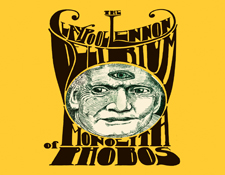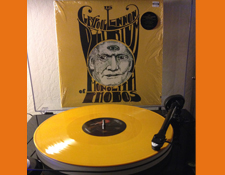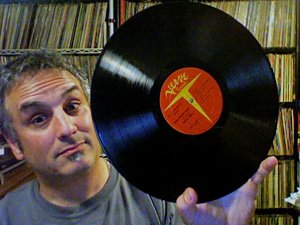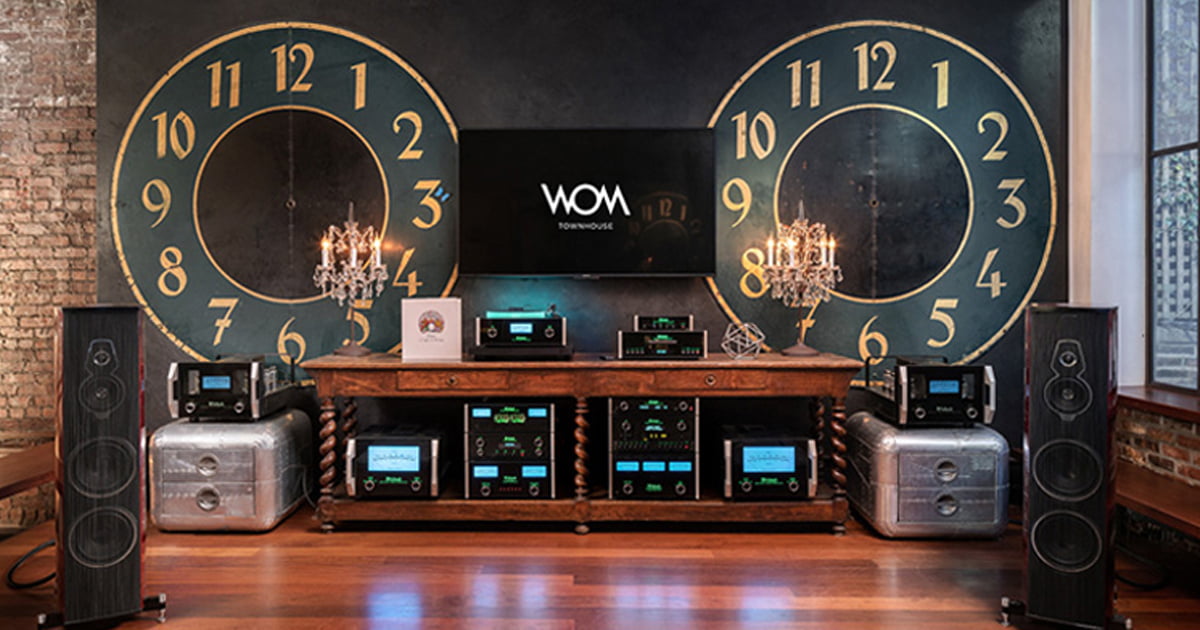It’s the time of year for saving money!
Initially I was as surprised as you probably are regarding the collaboration between Sean Lennon and Les Claypool (yes, he of Primus fame). I mean, they met while on tour together (Sean’s band The Ghost of a Saber Tooth Tiger — aka The Goastt — opened for them) and became friends, jamming and all that good stuff that happens to cool musicians who make a connection.
 Listening to their first studio-recorded results — called The Monolith of Phobos — the album plays like a logical extension from Lennon’s last Goastt album, Midnight Sun (one of my faves last year which I reviewed). Phobos perhaps more directly explores that late 60s early 70s pre-Dark Side of the Moon psych vibe, while adding some funkier bass pyrotechnics and Claypool’s freewheeling Zappa-esque spirit for all things madcap and fun.
Listening to their first studio-recorded results — called The Monolith of Phobos — the album plays like a logical extension from Lennon’s last Goastt album, Midnight Sun (one of my faves last year which I reviewed). Phobos perhaps more directly explores that late 60s early 70s pre-Dark Side of the Moon psych vibe, while adding some funkier bass pyrotechnics and Claypool’s freewheeling Zappa-esque spirit for all things madcap and fun.
The result is something that sounds at once familiar and yet different — hallmarks of some of the best music that crosses genre’s.
Monolith of Phobos is Claypool and Lennon’s journey to the center of the third eye …
Reading the album credits as I was listening to this for the upteenth time, its was kinda impressive to realize that on most of the tracks, Lennon plays all the instruments aside from bass. That includes drums; I didn’t realize he played drums. Think about that — he’s got to be pretty darn good to be able to lock in with a masterful bassist the likes of Claypool. What’s also cool is that for the first time I’m hearing Les Claypool is actually a pretty solid singer when he’s not doing his comic book voicings — that is not a slam, mind you, just an observation and based on my limited exposure to his work with Primus (I have a few of their albums, which I like).
But what does this so-called Claypool-Lennon Delirium sound like?
 Well…. its kinda like… hmm… well… image what might happen if Syd Barrett era Pink Floyd had a more lyrical bassist in the band such as The Move’s Ace Kefford and they were playing music that fell compositionally somewhere between Parachute era Pretty Things, Meddle era Floyd and later period tracks from some other big name band that also recorded at Abbey Road studios.
Well…. its kinda like… hmm… well… image what might happen if Syd Barrett era Pink Floyd had a more lyrical bassist in the band such as The Move’s Ace Kefford and they were playing music that fell compositionally somewhere between Parachute era Pretty Things, Meddle era Floyd and later period tracks from some other big name band that also recorded at Abbey Road studios.
My favorite tracks thus far include the two part suite called “Cricket and The Genie” (that title alone should give you some idea of the journey this record takes its listeners on). Replete with its epic end-song chant of “you oughta try it, you really oughta try it,” the song simultaneously echoes Sean’s Dad’s “I Am The Walrus” (ie. the fade out choir chant of “Everybody’s got one….”) while also rolling around in mud with the whimsical madness found in seminal epics by the likes of Procol Harum (“In Held Twas in I” comes to mind)
The perhaps most controversial track on The Monolith of Phobos — “Bubbles Burst” — may also be my favorite. And that is not just because the surreal video is is so.. well…. surreal, or that the eyebrow-raising subject matter initially appears to be more curious than it really is (its apparently about Sean’s childhood memories of spending time with Michael Jackson and the arrival of his pet Chimpanzee, Bubbles — seeing all that must have been supremely strange for a 10 year old to process!). No, the thing about this song that is most curious (to me, at least) is that Sean clearly goes down that path of all things Beatle-y and classically Lennon-esque (if you will), embracing the kinds of sounds and production styles of the mid-late 1960s in the best possible way : the way his Dad did them! The sound of “Bubbles Burst” is simultaneously modern and retro, with vocal effects and compositional choices snugly bookended between 1967-69 or so (think Strawberry Fields, I’m So Tired, Dear Prudence etc.).
None of this is a bad thing, mind you. I think it is pretty wonderful, actually.
 So, while I could babble on about this kinda stuff forever, you are probably wondering how The Monolith of Phobos sounds on vinyl? I think it sounds pretty darn fine. I don’t know for sure but I’d suspect it was recorded digitally and at high resolution. It sounds vintage in all its production styles yet still feels kinda modern (and by that I mean, digital). This is not a bad thing as such… this is one of those digital recordings that I don’t mind and in fact like because, well, it doesn’t interfere with the music. The recording sounds good no matter how it was recorded. It doesn’t hurt my ears when I play it loudly. The MP3 downloads that came with it even sound fine for playing the album in the car.
So, while I could babble on about this kinda stuff forever, you are probably wondering how The Monolith of Phobos sounds on vinyl? I think it sounds pretty darn fine. I don’t know for sure but I’d suspect it was recorded digitally and at high resolution. It sounds vintage in all its production styles yet still feels kinda modern (and by that I mean, digital). This is not a bad thing as such… this is one of those digital recordings that I don’t mind and in fact like because, well, it doesn’t interfere with the music. The recording sounds good no matter how it was recorded. It doesn’t hurt my ears when I play it loudly. The MP3 downloads that came with it even sound fine for playing the album in the car.
The cover art adds to the psychedelic flavor of the recording, The album is pressed on two well pressed, very quiet — “dead quiet” even, I’m just kinda gettire tired of using that audiophile cliche phrase, kidz — gold-yellow swirl colored vinyl discs,each with custom labels, a different one for each side.
I’m hoping I’ll get to see The Claypool-Lennon Delirium on tour. I’ve seen videos of them already up on YouTube and the band sounds pretty grand, even tackling a tune Sean’s Dad never got to perform live, “Tomorrow Never Knows” and doing the song an honorable solid.
Monolith of Phobos is a bit like walking through an amusement park funhouse, with one twisted mirror reflection and surprise doorway leading to another mysterious pathway. And aren’t all the best musical experiences like that, actually?
A good trip, for all the right reasons.






